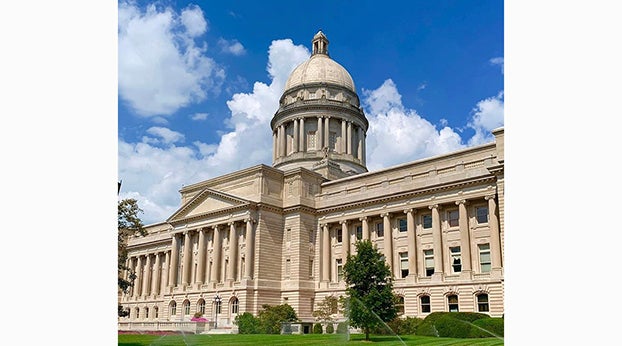Senate approves income tax rate cut, sends it on to governor
Published 10:09 am Thursday, February 9, 2023

- The Kentucky State Capitol. File photo.
|
Getting your Trinity Audio player ready...
|
Legislation introduced in the House that would cut the state’s income tax rate from 4.5% to 4%, effective Jan. 1, 2024, saw final passage in the Senate on Wednesday, sending it on to the governor’s desk.
House Bill 1, sponsored by Rep. Brandon Reed, R-Hodgenville, marks the second step in income tax rate cuts that could eventually go to zero based on the amount of budget surpluses and the budget reserve trust fund, also known as the rainy day fund.
Sen. Christian McDaniel, R-Ryland Heights, carried the bill on the Senate floor. He told his colleagues, “House Bill 1 is the culmination of conversations and efforts that have gone on in this chamber and around the Commonwealth for the better part of the last decade or so.”
McDaniel noted, “At times like this, when economic competitiveness is at an all-time high, and the states compete for jobs and employers, tax policy is the single most influential lever that we have.”
Sen. David Yates, D-Louisville, spoke against the bill, noting the income tax rate cut has been offset by a corresponding increase in the state’s 6% sales tax receipts, as exemptions were removed for about three dozen categories.
“For the majority of Kentuckians, this is less money in their pockets,” he stated. “We have given more money back to wealthy people, and a disproportionate rate to our working families.”
The measure was approved, 30-5, with the vote going strictly along party lines.
There was much less controversy on another bill taken up by the Senate. House Bill 2 provides $16.6 million in fiscal year 2022-2023 from the rainy day fund to the Department of Veterans’ Affairs, for additional construction costs incurred in the Bowling Green Veterans Center.
That money comes from $17 million that was appropriated to the Transportation Cabinet as the state’s match to federal funding to build an electric vehicle charging network around the state. However, the federal government said the match was not required, so another bill currently pending before the Senate, HB 11, will put that money back into the rainy day fund.





